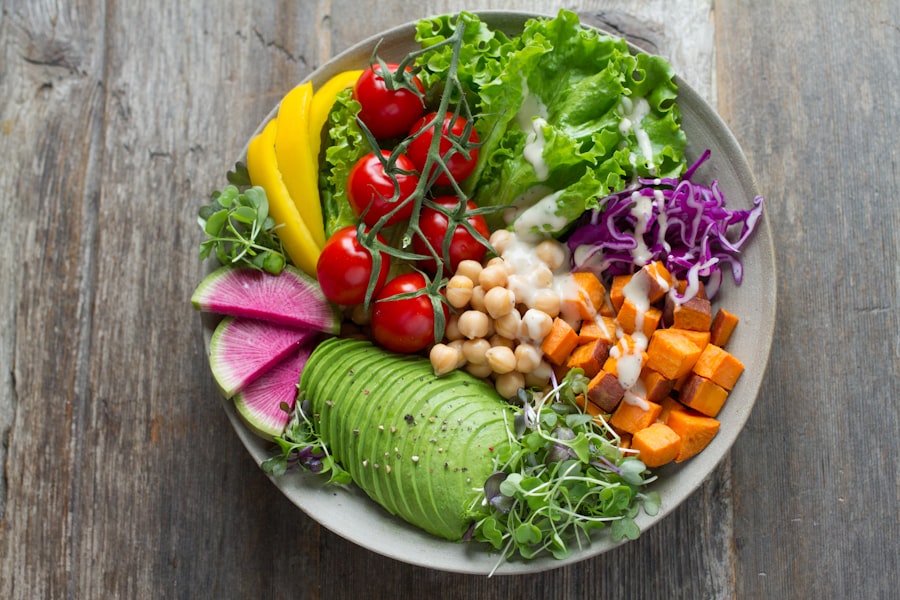
Fuel Up with Healthy Vegan Protein Bars
Vegan protein bars are a type of snack bar that is specifically formulated to provide a convenient and portable source of protein for individuals following a vegan diet. These bars are typically made with plant-based protein sources, such as pea protein, brown rice protein, or hemp protein, and are free from any animal-derived ingredients. Vegan protein bars have gained popularity in recent years as more people are adopting plant-based diets and looking for convenient ways to meet their protein needs.
The history of vegan protein bars can be traced back to the early 2000s when the demand for plant-based alternatives started to grow. As more people became aware of the health and environmental benefits of a vegan lifestyle, there was a need for convenient and tasty options that could provide the necessary nutrients. This led to the development of vegan protein bars that could be easily consumed on-the-go and provide a good source of protein for vegans.
Key Takeaways
- Vegan protein bars are a convenient and tasty way to supplement protein in a plant-based diet.
- Protein is essential for muscle growth and repair, and can be found in a variety of vegan sources such as nuts, seeds, and legumes.
- Vegan protein bars offer benefits such as sustained energy, improved digestion, and reduced inflammation.
- When choosing a vegan protein bar, look for ingredients such as whole grains, nuts, and plant-based protein sources like pea or soy.
- Making your own vegan protein bars at home allows for customization and control over ingredients, and can save money in the long run.
The Importance of Protein in a Vegan Diet
Protein is an essential nutrient that plays a crucial role in the body. It is responsible for building and repairing tissues, producing enzymes and hormones, and supporting immune function. For vegans, who do not consume any animal products, it is important to ensure an adequate intake of protein from plant-based sources.
The recommended daily protein intake for vegans varies depending on factors such as age, sex, weight, and activity level. However, a general guideline is to aim for around 0.8 grams of protein per kilogram of body weight. This means that a sedentary adult who weighs 68 kilograms would need about 55 grams of protein per day.
There are many plant-based sources of protein that vegans can incorporate into their diet. Some examples include legumes (such as beans, lentils, and chickpeas), tofu and tempeh, quinoa, nuts and seeds, and whole grains. However, it can sometimes be challenging to meet protein needs solely through whole foods, which is where vegan protein bars can be a convenient and practical option.
The Benefits of Vegan Protein Bars
Vegan protein bars offer several benefits that make them a popular choice for individuals following a vegan diet.
One of the main advantages of vegan protein bars is their convenience. They are pre-packaged and can be easily carried in a bag or pocket, making them a convenient option for on-the-go snacking. This is especially beneficial for busy individuals who may not have time to prepare or sit down for a full meal.
Another benefit of vegan protein bars is portion control. Each bar is typically portioned to provide a specific amount of protein, which can help individuals track their intake and ensure they are meeting their daily protein needs. This can be particularly useful for those who are trying to manage their weight or follow a specific macronutrient ratio.
Vegan protein bars are also nutrient-dense, meaning they provide a high amount of nutrients relative to their calorie content. They are often fortified with vitamins and minerals, such as iron, calcium, and B vitamins, which are important for vegans who may have higher nutrient needs due to the exclusion of animal products from their diet.
Lastly, vegan protein bars can be a satisfying snack that helps curb hunger and cravings. The combination of protein, healthy fats, and fiber in these bars can help promote feelings of fullness and satiety, making them a great option for those looking to manage their appetite or maintain a healthy weight.
How to Choose the Right Vegan Protein Bar for You
| Brand | Protein Content (g) | Calories | Sugar Content (g) | Price per Bar |
|---|---|---|---|---|
| Garden of Life | 20 | 200 | 1 | 2.50 |
| No Cow | 22 | 190 | 1 | 2.00 |
| Clif Bar | 9 | 250 | 21 | 1.50 |
| Orgain | 10 | 150 | 5 | 2.00 |
When choosing a vegan protein bar, it is important to consider your dietary needs and preferences. Here are some factors to consider:
1. Dietary Needs: Consider any dietary restrictions or allergies you may have. Some bars may contain common allergens such as nuts or soy, so it’s important to read the ingredient list carefully.
2. Ingredient List and Nutrition Label: Read the ingredient list to ensure that the bar is made with whole food ingredients and does not contain any artificial additives or preservatives. Check the nutrition label to see the amount of protein, carbohydrates, and fats in each bar, as well as the calorie content.
3. Certifications and Third-Party Testing: Look for bars that have been certified by reputable organizations, such as the Vegan Society or Non-GMO Project. This ensures that the bar meets certain standards and does not contain any animal-derived ingredients or genetically modified organisms. Additionally, some brands may undergo third-party testing to verify the accuracy of their nutrition claims.
Top Ingredients to Look for in Vegan Protein Bars
When choosing a vegan protein bar, it is important to look for high-quality ingredients that provide a good source of protein and other essential nutrients. Here are some top ingredients to look for:
1. Plant-based Protein Sources: Look for bars that use high-quality plant-based protein sources, such as pea protein, brown rice protein, or hemp protein. These sources are rich in essential amino acids and provide a complete protein profile.
2. Whole Food Ingredients: Choose bars that are made with whole food ingredients, such as nuts, seeds, fruits, and grains. These ingredients provide additional nutrients, fiber, and antioxidants.
3. Natural Sweeteners: Avoid bars that contain artificial sweeteners or excessive amounts of added sugars. Instead, look for bars that use natural sweeteners like dates, maple syrup, or stevia.
4. Healthy Fats: Look for bars that contain healthy fats from sources like nuts, seeds, or coconut oil. These fats provide satiety and help support overall health.
How to Make Your Own Vegan Protein Bars at Home

Making your own vegan protein bars at home can be a fun and cost-effective way to ensure you are getting high-quality ingredients and flavors that you enjoy. Here are some benefits of making your own bars:
1. Control over Ingredients: When making your own bars, you have complete control over the ingredients that go into them. You can choose high-quality plant-based protein sources, whole food ingredients, and natural sweeteners.
2. Customizable Flavors: Making your own bars allows you to experiment with different flavors and combinations. You can add your favorite nuts, seeds, fruits, or spices to create a bar that suits your taste preferences.
3. Cost Savings: Making your own bars can be more cost-effective than buying pre-packaged ones. You can buy ingredients in bulk and make a large batch of bars that will last for several weeks.
To make your own vegan protein bars, start with a basic recipe and customize it to your liking. Here is a simple recipe to get you started:
Ingredients:
– 1 cup plant-based protein powder
– 1 cup nut butter (such as almond or peanut butter)
– 1/2 cup liquid sweetener (such as maple syrup or agave nectar)
– 1/4 cup nuts or seeds (such as almonds, walnuts, or chia seeds)
– 1/4 cup dried fruit (such as dates, raisins, or cranberries)
– Optional add-ins: spices (such as cinnamon or vanilla extract), chocolate chips, or coconut flakes
Instructions:
1. In a large bowl, combine the protein powder, nut butter, and liquid sweetener. Mix well until a thick dough forms.
2. Add in the nuts or seeds and dried fruit. Mix until well combined.
3. If desired, add any optional add-ins and mix until evenly distributed.
4. Line a baking dish with parchment paper and press the mixture into the dish.
5. Place the dish in the refrigerator for at least 1 hour to allow the bars to set.
6. Once set, remove the bars from the dish and cut into desired shapes and sizes.
7. Store the bars in an airtight container in the refrigerator for up to 2 weeks.
Tips for storing and freezing homemade vegan protein bars:
– Store the bars in an airtight container in the refrigerator to keep them fresh and prevent them from drying out.
– If you have made a large batch of bars, you can freeze them for longer storage. Wrap each bar individually in plastic wrap or place them in a freezer-safe container. They can be stored in the freezer for up to 3 months. To thaw, simply remove from the freezer and let sit at room temperature for about 10-15 minutes.
Vegan Protein Bars for Pre- and Post-Workout Fuel
Fueling your body before and after workouts is important for optimal performance and recovery. Vegan protein bars can be a convenient option for pre- and post-workout fuel. Here’s why:
1. Importance of Fueling Before Workouts: Eating a balanced meal or snack before a workout provides your body with the energy it needs to perform at its best. Consuming protein before a workout helps support muscle protein synthesis, which is important for muscle growth and repair.
2. Recommended Macronutrient Ratios for Pre-Workout Bars: A pre-workout bar should provide a balance of carbohydrates, protein, and healthy fats. Aim for a ratio of approximately 2:1:1 of carbohydrates to protein to fats. This will provide your body with the necessary fuel and nutrients to sustain your workout.
3. Examples of Pre-Workout Bars: Look for bars that contain a good source of carbohydrates, such as oats or dried fruit, to provide quick energy. They should also contain a moderate amount of protein, such as 10-15 grams per bar, to support muscle protein synthesis. Healthy fats from sources like nuts or seeds can also provide sustained energy.
Vegan Protein Bars for On-the-Go Snacking
On-the-go snacking is a common occurrence in today’s busy world. Vegan protein bars can be a convenient and nutritious option for those who need a quick and portable snack. Here’s why:
1. Benefits of On-the-Go Snacking: On-the-go snacking allows you to fuel your body and satisfy hunger between meals, especially when you don’t have time to sit down for a full meal. It can also help prevent overeating later in the day by keeping your hunger levels in check.
2. Examples of Portable Vegan Protein Bars: Look for bars that are individually wrapped and easy to carry in a bag or pocket. Bars that are not too crumbly or sticky are ideal for on-the-go snacking. Some popular options include Larabar, RXBAR, and Clif Bar.
3. Tips for Keeping Bars Fresh and Accessible: To keep your bars fresh and accessible, consider storing them in an airtight container or resealable bag. Keep a few bars in your bag or car so that you always have a healthy snack option on hand when hunger strikes.
Vegan Protein Bars for Weight Loss and Management
Protein plays an important role in weight loss and management. It helps promote feelings of fullness, supports muscle growth and repair, and can help increase metabolism. Vegan protein bars can be a useful tool for those looking to lose weight or maintain a healthy weight. Here’s why:
1. Role of Protein in Weight Loss and Management: Protein is known to be more satiating than carbohydrates or fats, meaning it helps keep you feeling full for longer. This can help reduce overall calorie intake and prevent overeating. Additionally, protein helps preserve lean muscle mass during weight loss, which is important for maintaining a healthy metabolism.
2. Recommended Macronutrient Ratios for Weight Loss Bars: A weight loss bar should provide a balance of protein, carbohydrates, and healthy fats, but with a slightly higher protein content. Aim for a ratio of approximately 3:1:1 of protein to carbohydrates to fats. This will help keep you feeling full and satisfied while providing the necessary nutrients for weight loss.
3. Examples of Weight Loss Bars: Look for bars that are lower in calories and sugar, but higher in protein and fiber. These bars can help keep you feeling full and satisfied without adding excess calories. Some examples include NuGo Slim, Quest Protein Bar, and ONE Bar.
Vegan Protein Bars for a Balanced and Nutritious Diet
While vegan protein bars can be a convenient and nutritious option, it is important to remember that they should not replace whole foods in your diet. They should be used as a supplement or snack to complement a balanced and varied diet. Here’s why:
1. Importance of Balance and Variety in a Vegan Diet: A balanced and varied diet is essential for meeting all of your nutrient needs. Whole foods provide a wide range of vitamins, minerals, antioxidants, and other beneficial compounds that cannot be replicated in a processed bar.
2. Examples of Bars that Provide a Balance of Macronutrients and Micronutrients: Look for bars that provide a balance of macronutrients (protein, carbohydrates, and fats) as well as micronutrients (vitamins and minerals). Some bars are specifically formulated to provide a complete nutritional profile, such as Vega One All-in-One Meal Bar or Garden of Life Organic Fit Bar.
3. Tips for Incorporating Bars into a Balanced Diet: Use vegan protein bars as a supplement or snack to complement your meals rather than replacing them entirely. Aim to consume whole foods as the foundation of your diet and use bars as a convenient option when needed. Be mindful of portion sizes and try to choose bars that provide a good source of protein and other essential nutrients.
In conclusion, vegan protein bars are a convenient and portable option for individuals following a vegan diet. They provide a good source of protein and other essential nutrients, making them a valuable tool for meeting dietary needs. When choosing a vegan protein bar, it is important to consider your dietary needs and preferences, read the ingredient list and nutrition label, and look for certifications and third-party testing. Additionally, making your own vegan protein bars at home can be a fun and cost-effective way to ensure high-quality ingredients and flavors that you enjoy. Whether you’re looking for pre- or post-workout fuel, on-the-go snacking options, or support for weight loss and management, there are vegan protein bars available to suit your needs. However, it is important to remember that these bars should not replace whole foods in your diet and should be used as a supplement or snack to complement a balanced and varied diet.
FAQs
What are vegan protein bars?
Vegan protein bars are snack bars that are made without any animal products and are designed to provide a high amount of protein to the body.
What are the benefits of eating vegan protein bars?
Eating vegan protein bars can help to increase muscle mass, improve athletic performance, aid in weight loss, and provide a convenient and healthy snack option.
What are some common ingredients in vegan protein bars?
Common ingredients in vegan protein bars include plant-based protein sources such as pea protein, brown rice protein, and hemp protein, as well as nuts, seeds, and dried fruits.
Are vegan protein bars suitable for people with food allergies?
Vegan protein bars can be a good option for people with food allergies, as they are often free from common allergens such as dairy, eggs, and gluten. However, it is important to always check the ingredient list to ensure that the bar is safe for consumption.
Can vegan protein bars be used as a meal replacement?
While vegan protein bars can be a convenient and healthy snack option, they should not be used as a meal replacement on a regular basis. It is important to consume a balanced diet that includes a variety of whole foods to ensure that the body is getting all of the nutrients it needs.
How much protein should be in a vegan protein bar?
The amount of protein in a vegan protein bar can vary, but a good rule of thumb is to look for bars that contain at least 10 grams of protein per serving. This will help to ensure that the bar is providing a significant amount of protein to the body.













